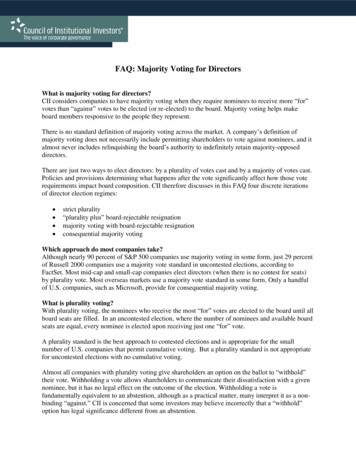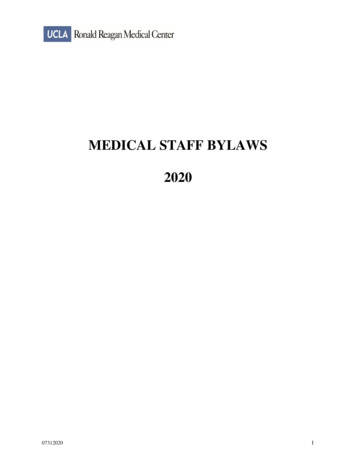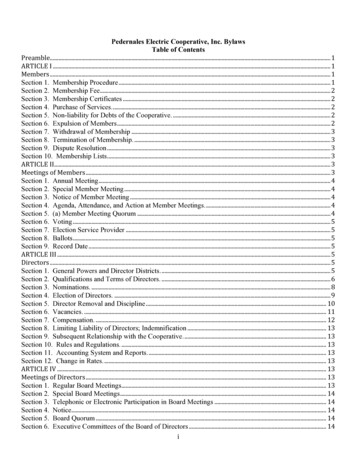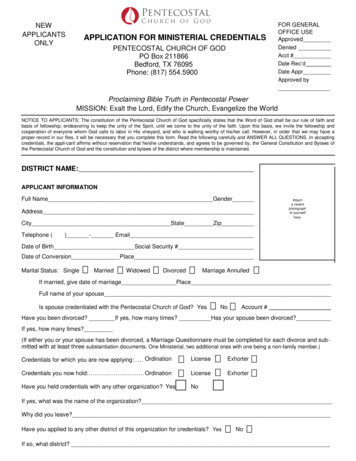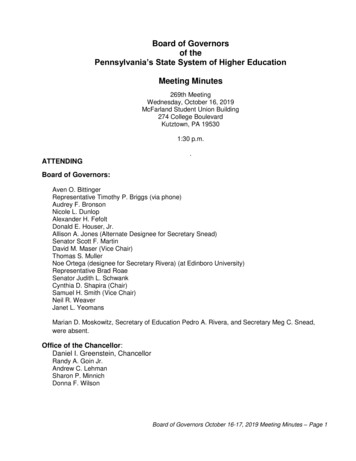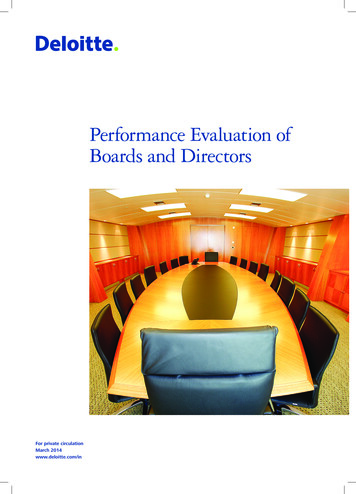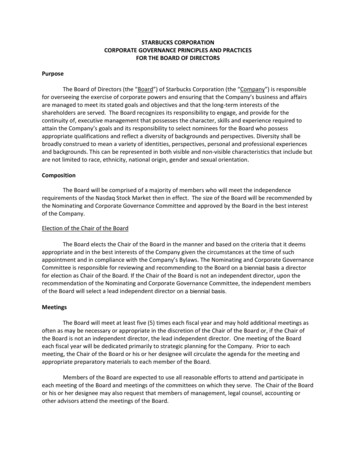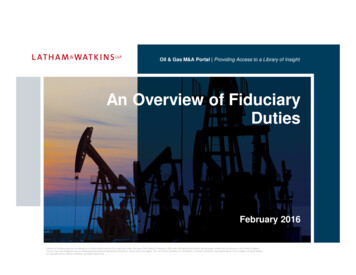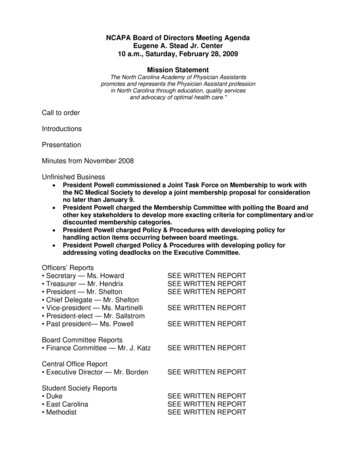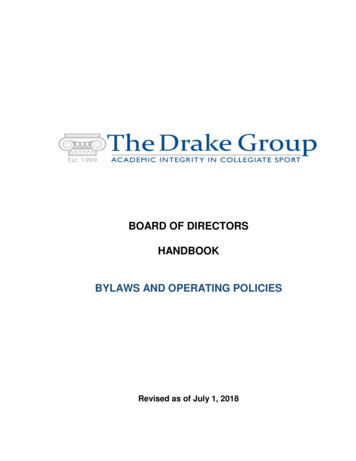
Transcription
BOARD OF DIRECTORSHANDBOOKBYLAWS AND OPERATING POLICIESRevised as of July 1, 2018
The Drake GroupApril, 2017Table of Contents1.0Mission, Goals and Objectives1.1Vision, Values, Mission, Goals and Objectives1.2History of the Organization2.0Incorporation Documents2.12.22.33.0Governance and Operating Structure3.13.23.33.43.53.63.74.0General Awards PoliciesRobert M. Hutchins AwardThe Drake Group Service AwardDrake Hero Awards (Transcending Collegiate Sport Award)The Drake Group Presidential CitationOfficial Statements and Positions6.17.0Conflict of Interest QuestionnaireAffirmative Action PolicyPolicy on Endorsement and Recommendation for Appointment orElection of Individuals to Positions or OfficesAwards and Recognition Programs5.15.25.35.45.56.0Organizational StructureBoard of Directors - Structure and Function3.2 A – Nomination Form: Board of Directors/OfficersBoard of Directors ResponsibilitiesTerms of Current Members - Board of DirectorsOfficer Duties and ResponsibilitiesStanding and Ad Hoc Committees and CouncilsMembership of Current Committees and CouncilsEthics Policies4.14.24.35.0BylawsArticles of IncorporationConflict of Interest PolicyPolicies and Procedures Governing Press Releases and Position Statements6.1 A TDG Position Statement Template6.1 B TDG Press Release TemplateMembership7.1Membership Categories, Annual Dues and Donations7.1 A Member Information and Volunteer FormPolicy HandbookTable of ContentsPage 2
The Drake Group8.0April, 2017Finance8.1Expense Report Policies and Guidelines8.1.A The Drake Group Expense FormPolicy HandbookTable of ContentsPage 3
The Drake GroupSECTION 1MISSION-GOALS-OBJECTIVESPolicy HandbookSection 1.0Section Cover Page
The Drake GroupFebruary, 20151.0 Mission, Vision, Value, Goals and Objectives advancing academic integrity in the conductof intercollegiate athleticsOUR VISIONTo create an atmosphere on collegecampuses that encourages personal andintellectual growth for all students, anddemands excellence and professionalintegrity from faculty charged withteaching.All college athletes in all competitivedivisions– because athletics at allcompetitive levels plays an importantrole in student development.Treating all persons with dignity,respect and kindheartedness.WE VALUE College athletes who work every day toachieve academic and athletic performanceexcellence.Demonstrating academic integrity andfiscal responsibility in the conduct ofintercollegiate athletic programs.The unique nature of athletics participationand its contributions to the development ofparticipantsFaculty and staff who passionately insist onacademic integrity in the conduct of athleticprograms.Coaches, athletic administrators andfamilies who provide knowledge, guidanceand encouragement to college athletes.WE ARE COMMITTEDTO THE IMPORTANCEOF Acting in the best interest of theeducation, health and welfare of allcollege athletesDemonstrating transparency,accountability and honesty in allcommunication and decision-makingDiversity – valuing college athletes ofevery race, color, religion, sex, sexualorientation, age, disability, marital statusand national originStewardship – carefully utilizing theresources available to usPolicy HandbookSection 1.0Page 1
hrough publicdisclosure ofinformationabout the qualityof educationcollege athletesreceiveREFORMMISSIONTo defendacademicintegrity inhighereducation fromthe corrosiveaspects ofcommercializedcollege sportsLobby forproposalsthat ensurequalityeducation forcollegeathletes.2014-18 OBJECTIVESDisseminate fact-based research and position statements to the mediaon current practices affecting the quality of education of college athletesCause the writing and publication of editorials, commentary andfeature articles related to college athlete educationDevelop and issue guidelines for the ethical conduct of athleteacademic support and advising programs.Recognize institutions that demonstrate model disclosure practices andprovide quality education to athletes.Recognize athletes who raise issues related to the quality of educationthey receive and call for action to advance academic success.Advance Congressional legislation to establish a President’sCommission on Intercollegiate Athletics reform.Advance the development of federal legislation that would create areplacement organization for the NCAA that would condition HigherEducation Act funding, a limited antitrust exemption and subpoena anddiscovery powers on the implementation of an educational soundmodel of intercollegiate athletics.Coordinate local and national reform efforts with other groups thatshare our mission, goals, and/or proposals.FAIRNESSSupport facultyand staff whosejob security andprofessionalstanding arethreatened whenthey defendacademicstandards.PUBLIC EDUCATIONInfluence publicdiscourse oncurrent issuesandcontroversies incollege sportActively defend through press releases and position statements thosefaculty and staff who are targets for retaliation for upholding basicacademic principles.Annually present the Robert M. Hutchins Award to a faculty or staffmember who takes a courageous stand to defend academic integrity inathletics at their institution.To present other awards or in other ways recognize faculty oradministrators for their leadership in advancing academic integrity inathletics.To issue fact- and principle-based position statements on currentissues and controversies in college sport.Cause the writing and publication of editorials, commentary andfeature articles on current issues and controversies in college sport.To provide the media covering current issues and controversies incollege sport with access to academic experts who can provide themost accurate information.MANAGEMENTEXCELLENCEManage staffand resourcesin a mannerthat ensuresstakeholdertrust95% of all TDG members rate their membership experience as “verygood” or “excellent” .Manage resources in a manner that generates exemplary auditedfinancials.Manage the organization budget in a manner in which expendituresdo not exceed allocated revenues and revenues annually increase.
The Drake GroupJune, 20151.2Organization HistoryHistoryThe Drake Group was founded in 1999 when Jon Ericson, a former professor and provost atDrake University, invited a distinguished group of college faculty, authors, and activists to atwenty-four-hour think tank in how to end academic corruption in college sport. Included inthe conference were members of faculty senates, journalists, athletic directors, and membersof organizations such as the NCAA and the Knight Foundation Commission on collegiate Sport.Out of the meeting emerged an organization initially called the National Association of Facultyfor Collegiate Athletic Reform (NAFCAR). The organization changed its name to The DrakeGroup in 2000 and also adopted bylaws and elected officers. The group’s mission and goalswere formally defined at an annual meeting at the Chicago meeting in 2003.Corporate History The Drake Group, Inc. was incorporated on 9/16/13 as a ConnecticutNonstock Corporation via a 9/6/13 certificate of incorporation (the “C/I)” which was filed withthe Connecticut Secretary of State on 9/6/13. The governing statute for the corporation is theConnecticut Revised Nonstock Corporation Act (the “Act”) Connecticut General Statutes(“C.G.S.”). 33-1000.et seq. The Drake Group received its 501 (c) (4) tax-exempt status on6/23/14. No portion of any moneys contributed by any person to a (c) (4) org, whether asmembership dues, as a donation/contribution/gift, or otherwise, can be claimed as a taxdeduction by said person. The 501 (c) (4) status allows the Drake Group to engage in politicallobbying and other advocacy behavior, but not to engage in campaigning on behalf of politicalcandidates.The Drake Group Logothe Drake Group logo was designed pro bono by the Silverman Group, a New Haven,Connecticut marketing company.In Residence at the University of New HavenPolicy HandbookSection 3.2Page 1
The Drake GroupJune, 2015In 2012, the newly elected president of the Drake Group, who was also a Professor in theDepartment of Management and Sport Management at the University of New Haven,suggested to the Drake Group Executive Committee that the Drake Group might benefit byhaving a home base in which to reside. As is the case with other faculty organizations, theDrake Group’s home base could change with each new president or simply establish itself atone university. The Executive committee decided to make the University of New Haven its firstcite and to decide later whether the location would change with each new president. TheDrake Group president met with the University of New Haven (UNH) President to request “inresidence status.” The university previously had “executives in residence” as visiting facultywho made several visits to campus during the year to interact with students and to visitclasses, usually with a modest honorarium. Organizations such as Orchestra New England, aConnecticut-based musical ensemble have also been “in residence.”These arrangements are generally quite informal, with each party benefiting in some way fromthe arrangement. In this case the Drake Group was able to build a website with the help of theUNH marketing department and its expert in website design. The Drake Group Newsletter alsomakes use of the university’s resources and expertise. A degree recipient from UNH whosupports the Drake Group’s mission and goals has provided pro bono legal assistance such ashelping the organization attain 501 C 4 not-for-profit status. The Drake Groups mailing addressis the University of New Haven.In return for recognizing the Drake Group as being “in residence,” UNH has benefited fromnation-wide publicity the Drake Group has generated. Drake Group press releases have beensent out of the UNH communications department, thus generating contacts on the DrakeGroup webpage which prominently display the UNH logo and highlight the in residence statusof the Drake Group and the University of New Haven. .Presidents of the Organization2016-18 David Ridpath, Ed.D. Ohio University2014-16 Gerald Gurney, Ph.D. University of Oklahoma2012-14 Allen Sack, Ph.D. University of New Haven2010-12 Jason Lanter Kutztown University2008-10 Katie Otto Western Carolina University2006-08 David Ridpath Ohio University2004-06 Lynda Bensel Myers University of Tennessee-Knoxville2000-04 Jon Ericson Drake UniversityPolicy HandbookSection 3.2Page 2
The Drake GroupSECTION 2INCORPORATION DOCUMENTSPolicy HandbookSection 2.0Section Cover Page
The Drake Group2015Revised as of August 6, 2015,BYLAWSOFTHE DRAKE GROUP, INC.-Adopted: September 6, 2013INDEX OF THE BYLAWSARTICLE IGeneral Overview . 3Section 1.1 - Corporate History; and the Governing State StatuteSection 1.2 - BackgroundSection 1.3 - Adoption of these BylawsARTICLE IIBoard of Directors . 3Section 2.1 - Number of Board Members, Term of Office and ElectionSection 2.2 - Powers, Rights and DutiesSection 2.3 - Standards of ConductSection 2.4 - Removal of a Board MemberSection 2.5 - VacanciesSection 2.6 - MeetingsSection 2.7 - No ProxiesSection 2.8 - Waiver of NoticeSection 2.9 - Quorum of Board Members; and the Vote of the BoardSection 2.10 - The Board Chair and Board Vice ChairSection 2.11 - Unanimous Written Consent to Corporate ActionSection 2.12 - Conference Call Meetings of the BoardSection 2.13 - The Executive CommitteeARTICLE IIIBoard Committees and the other Committees of the Corporation .8Section 3.1 - General Provisions Re: the Board CommitteesSection 3.2 - The Standing Committees of the BoardSection 3.3 - Ad Hoc Committees and Task Forces of the Board and the CorporationARTICLE IVOfficers of the Corporation . 10Section 4.1 - DesignationSection 4.2 - Election; and Term of OfficeSection 4.3 - Removal of OfficersSection 4.4 - The SecretarySection 4.5 - The TreasurerSection 4.6 - Standards of ConductARTICLE VMembers . 11Section 5.1 - An Overview Re: the Corporation's MembersSection 5.2 - MeetingsSection 5.3 - One Class of Members; the Annual DuesPolicy HandbookSection 2.1Page 1
The Drake Group2015Revised as of August 6, 2015,ARTICLE VIConflicts of Interest Policy .Section 6.1 - The PolicyARTICLE VIIIndemnification and Miscellaneous .Section 7.1 - Indemnification; and the Federal VPASection 7.2 - NoticesSection 7.3 - Fiscal YearSection 7.4 - No WaiverSection 7.5 - DefinitionsSection 7.6 - TermsSection 7.7 - Statutory ReferencesSection 7.8 - Compensation DecisionsSection 7.9 - The Obligation of Good Faith and Fair Dealing1112ARTICLE VIIIAmendments to, or Repeal of, the Bylaws .Section 8.1 - The Bylaws13ARTICLE IXCompliance with the Internal Revenue Code and the Act .Section 9.1 - The Compliance13Policy HandbookSection 2.1Page 2
The Drake Group2015Revised as of August 6, 2015,THE BYLAWSARTICLE IGeneral OverviewSection 1.1 - Corporate History; and the Governing State Statute.The Drake Group, Inc. (the "Corporation") was incorporated on 9/6/13 as a Connecticutnonstock corporation via a 9/6/13 certificate of incorporation (the "C/I"), which was filed withthe Connecticut Secretary of the State on 9/6/13. The governing statute for the Corporation is theConnecticut Revised Nonstock Corporation Act (the "Act"), Connecticut General Statutes("C.G.S.") §§33-1000, et seq.Section 1.2 - Background.Dr. Jon Ericson, Ph.D., a former professor and provost at Drake University, founded in1999 an organization consisting of college faculty members, athletic directors, authors andothers, who had a common interest in assisting colleges and universities to ensure a qualityeducation for their student athletes. The organization was initially named the NationalAssociation of Faculty for College Athletic Reform, but changed its name to the Drake Group in2000 based on the location of the group's first meeting, viz., at Drake University. In addition, thegroup was recently granted "in residence" status by the University of New Haven in the Fall of2012, and it has now been incorporated via the 9/6/13 CII.Section 1.3 - Adoption of these Bylaws.These Bylaws were duly adopted by the Corporation's Sole Incorporator, Philip H.Bartels, via his 9/6/13 Consent to Action in connection with the Organizational Meeting of theCorporation. (A reference hereinafter to a "Bylaws Section" shall be a reference to a Section ofthese Bylaws.)ARTICLE IIBoard of DirectorsSection 2.1 - Number of Board Members, Term of Office and Election.(a) Governance of the Corporation. The business and affairs of the Corporation shallbe governed by the Board of Directors. The Board shall consist of a minimum "fixed" number ofthree persons and a maximum "fixed" number of fifteen persons (the "Board Members"). Themaximum fixed number of Board Members may be increased or decreased by an amendmentof these Bylaws (See Bylaws Section 8.1), but no decrease in the maximum fixed number ofBoard Members shall affect the unexpired term of any Board Member.(b) Term of Office. The term of office of each Board Member (except for a replacementBoard Member- See Bylaws Section 2.5(a)) shall be two years; and the terms of approximatelyone-half of the Board Members shall expire annually or (as the Board may determine) the termsof all the Board Members shall expire at the same time. The term of office of a Board Member(except for a replacement Board Member) shall commence on the next July 1st after the BoardMember's election (or sooner as the Board may determine in its discretion). There shall be nolimitation regarding the number of terms (consecutive on otherwise) that a Board Member mayserve.Policy HandbookSection 2.1Page 3
The Drake Group2015Revised as of August 6, 2015,(c) The ex officio Members of the Board. The persons who are then-serving as thefollowing Officers of the Corporation shall be ex officio members of the Board (i.e., they shall bemembers of the Board automatically as a result of being an Officer of the Corporation), viz.: thePresident; the Present-Elect; the Past-President; the Secretary; and the Treasurer.(d) Election of Board Members and Officers. All members of the Board and Officersshall first be nominated by a Member. After such nomination, the person shall then be eligiblefor election as a Board Member by a mail or e-mail vote of all Members which election shallcustomarily occur prior to July 1 each year. A majority of all members voting is required forelection.Section 2.2 - Powers, Rights and Duties.(a) Overview. The Board shall have the powers, rights and duties necessary orappropriate for the proper governance of the business and affairs of the Corporation, except asmay be limited by the CII, these Bylaws or the Act.(b) Enumeration. The Board's powers, rights and duties shall include (without limitation)the following:(i) The approval of the Corporation's mission statement, vision statement and thestrategic plan; the approval of the institutional policies of the Corporation; the periodic review ofthe same (including the approval of any necessary changes thereto); and an evaluation of theimplementation thereof.(ii) The approval of the annual budget, and the general long-range financial plansof the Corporation; and an evaluation of the implementation thereof.(iii) The approval of the general policies and guidelines for the Corporation'srevenue-raising activities; and an evaluation of the implementation thereof.(iv) The approval of all significant Corporation projects; and an evaluation of theimplementation thereof.(v) Such other and additional powers, rights or duties as the Board maydetermine in its discretion to be necessary or appropriate in connection with the Board'sgovernance of the Corporation.Section 2.3 - Standards of Conduct.As required by the Act, at C.G.S. §33-1104(a), each Board Member, in the performanceof his/her duties, shall discharge said duties: (i) in good faith; (ii) with the care an ordinarilyprudent person in a like position would exercise under similar circumstances; and (iii) in amanner he/she reasonably believes to be in the best interests of the Corporation.Section 2.4 - Removal of a Board Member.The Board, by a majority of the then-serving Board Members, may remove anyone or more ofthe Board Members with or without cause; provided that the notice of the subject meeting of theBoard shall have adequately described the proposed removal.Policy HandbookSection 2.1Page 4
The Drake Group2015Revised as of August 6, 2015,Section 2.5 - Vacancies.(a) Filling a mid-term Vacancy by a replacement Board Member. Except for a vacancycaused by the expiration of a Board Member's term of office, a vacancy in the Board may befilled by the election of a replacement Board Member at a regular or special meeting of theBoard. Each person so elected shall then be a Board Member until the following July 1st.(b) Adequate Notice to the Board. With regard to any candidate nominated to be areplacement Board Member, and in order to ensure that proper consideration is given at thesubject Board Meeting to the candidate, there shall be full notice given to the Board Membersprior to the Board Meeting in order to adequately apprise them about the candidate.Section 2.6 - Meetings.(a) Regular Meetings; Notice. There shall be a customary minimum of two regularmeetings of Board during each "Fiscal Year" (See Bylaws Section 7.3), with the Annual Meetingof the Board to be typically held in June. The specific date and time of all Board Meetings shallbe reasonably selected by the Board Chair. A "Notice" (See Bylaws Section 7.2) of a regularBoard Meeting shall be sent to each Board Member at least five calendar days prior to themeeting; provided, however, in the event of extraordinary circumstances, the minimum notice ofa board meeting shall then be reduced to two calendar days. Subject to Bylaws Sections 2.4.2.S(b) and 8.1: (i) no notice of the agenda needs to be given in advance of the meeting; and (ii) anybusiness can be transacted at the meeting.(b) Special Meetings; Notice. Special Meetings of the Board shall be called by theBoard Chair or via the written request of two or more Board Members. The only business thatmay be transacted at a Special Meeting are the matters that are referred to in the Notice of theSpecial Meeting, which Notice shall be sent to each Board Member (in the absence of anemergency or other compelling circumstances, as may be determined by the Board Chair inhis/her discretion) at least one calendar day (24 hours) prior to the subject Special Meeting.(c) Location of Meetings. All meetings of the Board shall be held at a reasonablelocation that is selected by the Board Chair, or held via a conference call (See Bylaws Section2.12) or via a Unanimous Written Consent to Action (See Bylaws Section 2.11).(d) The Minutes. The Minutes of each Board Meeting shall customarily be transmittedby the "Secretary" (See Bylaws Section 4.4) to each Board Member within approximately fourweeks after a Board Meeting (but no later than the date that the Notice of the next BoardMeeting is given). In connection with the Minutes: (i) they can be stated in summary form; and(ii) they can be recorded and prepared by the Secretary, by a Board Member or by a personwho is invited to attend a Board Meeting in order to undertake the Minutes-taking role (forexample, an administrative assistant to, or a graduate student of, a Board Member).(e) Attendance at Board Meetings by non-Board Members. In the discretion of theBoard Chair: (i) he/she may invite one or more persons to be observers at a Board Meeting; and(ii) he/she may permit observers to speak at a Board Meeting, but they shall not be entitled tovote.Section 2.7 - No Proxies.Policy HandbookSection 2.1Page 5
The Drake Group2015Revised as of August 6, 2015,Proxies are not permitted in connection with any Board Meeting, Board ExecutiveCommittee Meeting or any Board Committee (or Subcommittee) Meeting.Section 2.8 - Waiver of Notice.Any Board Member may waive notice of any meeting in writing. Attendance by a BoardMember at any meeting of the Board (or at a Board Committee or Subcommittee Meeting) shallconstitute a waiver of notice. If all the Board Members are present at a meeting, no notice shallbe required, and any business may be transacted at such meeting.Section 2.9 - Quorum of Board Members; and the Vote of the Board.(a) The Quorum. At all meetings of the Board, a minimum of one half of the number ofthen-sitting Board Members, but no less than four, whichever is greater, shall constitute aquorum for the transaction of business. If, at any meeting, there shall be less than a quorumpresent, a majority of those present may reschedule the meeting to a new date. At anyrescheduled or adjourned meeting at which a quorum is then present, any business that mighthave been transacted at the meeting originally called may be transacted without further notice.(b) Valid Vote. The vote of a majority of the Board Members in attendance at a BoardMeeting, at which a quorum is present and is acting throughout, shall be a valid vote of theBoard for all purposes except where in these Bylaws or the Act a higher percentage vote isrequired.Section 2.10 - The Board Chair and Board Vice-Chair.There shall be a Board Chair and a Board Vice-Chair, as follows:(a) Designation. The Board Chair and the Board Vice-Chair shall respectively be thoseBoard Members of the Corporation who are the then-serving President and President-Elect ofthe Corporation (See Bylaws Section 4.1).(b) Term of Office. The Board Chair and Board Vice-Chair shall each have a two-yearterm in said capacities; and their terms of office shall commence on the next July 1st followingtheir respective elections as the President and President-Elect, unless the Board were to decideupon a different commencement date of the terms of office. There shall be no limitationregarding the number of terms (consecutive or otherwise) that a Board Chair and aBoard Vice-Chair can serve.(c) The Role of the Board Chair. In connection with Board governance matters, theBoard Chair shall have the following rights and duties: (i) presiding at all meetings of the Boardand the Executive Committee (if any); (ii) the appointment of the Chairs, Vice Chairs andmembers of each "Standing Committee", "Ad Hoc Committee" and "Task Force" (See BylawsSections 3.1-3.3); (iii) the ex officio membership, along with the Board Vice Chair, as votingmembers, on each Standing Committee and Board Ad Hoc Committee (and their attendance atany Committee meeting - Board or non-Board - shall be counted as part of the quorum); and(iv) such other rights and duties as the Board may prescribe from time to time.(d) The Role of the Board Vice-Chair. The Board Vice-Chair shall, in the absence ofthe Board Chair, timely undertake all rights and duties of the Board Chair.Policy HandbookSection 2.1Page 6
The Drake Group2015Revised as of August 6, 2015,Section 2.11 - Unanimous Written Consent to Corporate Action.If the Board Members unanimously consent in writing to any action taken or to be takenby the Board, such action shall be a valid action as though it had been taken at a meeting of theBoard. The Board Members' consents can be given via email, mail or hand-delivery; and theSecretary shall file such consents with the minutes of the meetings of the Board.Section 2.12 - Conference Call Meetings of the Board.Meetings of the Board (and any Board Committee meetings) can be held via aconference telephone call, via skype or via another reliable communications process whichallows all persons participating in the meeting to hear each other at the same time. In addition, aBoard Member who is unable to be physically present at a Board Meeting (or a BoardCommittee or Subcommittee Meeting) is entitled to attend the meeting via telephone call orother reliable communications process. Participation by the means set forth in this BylawsSection 2.12 shall constitute the presence in person at a meeting.Section 2.13 - The Executive Committee.(a) Composition. The Executive Committee, if and when established, shall becomprised of a minimum of three Board Members, as follows: (i) the Board Chair and the BoardVice Chair; and (ii) another Board Member.(b) Authority of the Executive Committee; Limitations. The Executive Committee,which shall be chaired by the Board Chair, shall have the power and authority to make thenecessary decisions on behalf of the Board that, in the prudent governance of the Corporation,cannot be postponed until the next Board Meeting but which instead need to be timely madeduring an interval between the Board's Meetings. Excepted from the foregoing authority, theExecutive Committee shall not have the authority to make any of the decisions prohibited by theAct, at C.G.S. §33-1101(e) (for example: the amending or repealing of these Bylaws, or theadoption of new Bylaws; the election of Board Members; or, the approval of a proposal todissolve the Corporation).(c) Meetings; Notice; Quorum. Meetings of the Executive Committee shall be held, asthe Board Chair may decide, or upon the written request of at least two Executive CommitteeMembers; and, each such meeting shall be promptly held at such time and date as may bereasonably selected by the Board Chair. In the absence of an emergency or other compellingcircumstances (as may be determined by the Board Chair in his/her sole discretion), the Noticeof any Executive Committee Meeting shall be given at least one calendar day (24 hours) inadvance. No notice of the agenda of an Executive Committee Meeting needs to be given inadvance of any meeting. A minimum of a majority of the then-serving Executive CommitteeMembers shall constitute a quorum.(d) Minutes to be sent to all Board Members. In order to ensure that the entire Boardis kept fully apprised of all matters approved by the Executive Committee, the Secretary shallcustomarily send a copy of its Minutes to each Board Member within two weeks after eachExecutive Committee Meeting (but no later than the date of the Notice of the next ExecutiveCommittee Meeting, or the date of the Notice of the next Board Meeting, whichever is earlier).Policy HandbookSection 2.1Page 7
The Drake Group2015Revised as of August 6, 2015,ARTICLE IIIBoard Committees and the other Committees of the CorporationSection 3.1 - General Provisions Re: the Board Committees.(a) The Standing and Ad Hoc Committees. The Standing Committees of the Board, inaddition to the Executive Committee, are listed in Bylaws Section 3.2. The Ad Hoc Committeesof the Board are described in Bylaws Section 3.3(b )(i). During each Fiscal Year, each BoardCommittee shall meet as often as necessary (but customarily at least once per Fiscal Year); andalthough each Committee's Meetings may typically be held in conjunction with the Board'sMeetings, nonetheless, a Committee may hold meetings at such time(s) which its CommitteeChair deems to be necessary or appropriate for the Committee to be able to effectivelyundertake its duties and responsibilities. Each Committee shall give a report (written or oral) onits activities at least one Board Meeting in each Fiscal Year, and more frequently if requested bythe Board Chair.(
Jul 06, 2018 · 5.4 Drake Hero Awards (Transcending Collegiate Sport Award) 5.5 The Drake Group Presidential Citation 6.0 Official Statements and Positions 6.1 Policies and Proced
